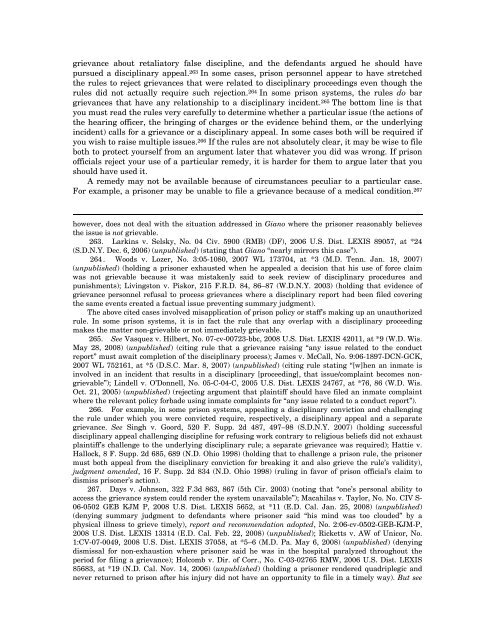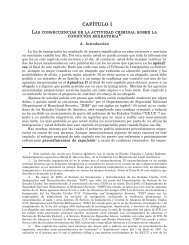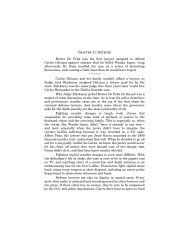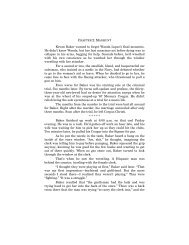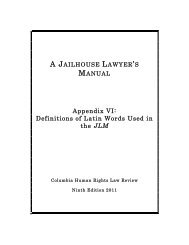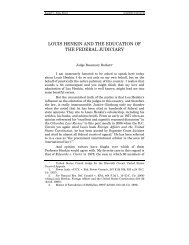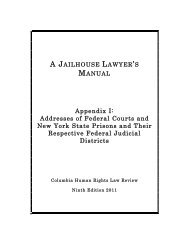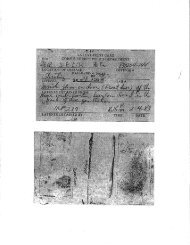A Jailhouse Lawyer's Manual Chapter 14 - Columbia Law School
A Jailhouse Lawyer's Manual Chapter 14 - Columbia Law School
A Jailhouse Lawyer's Manual Chapter 14 - Columbia Law School
Create successful ePaper yourself
Turn your PDF publications into a flip-book with our unique Google optimized e-Paper software.
grievance about retaliatory false discipline, and the defendants argued he should have<br />
pursued a disciplinary appeal. 263 In some cases, prison personnel appear to have stretched<br />
the rules to reject grievances that were related to disciplinary proceedings even though the<br />
rules did not actually require such rejection. 264 In some prison systems, the rules do bar<br />
grievances that have any relationship to a disciplinary incident. 265 The bottom line is that<br />
you must read the rules very carefully to determine whether a particular issue (the actions of<br />
the hearing officer, the bringing of charges or the evidence behind them, or the underlying<br />
incident) calls for a grievance or a disciplinary appeal. In some cases both will be required if<br />
you wish to raise multiple issues. 266 If the rules are not absolutely clear, it may be wise to file<br />
both to protect yourself from an argument later that whatever you did was wrong. If prison<br />
officials reject your use of a particular remedy, it is harder for them to argue later that you<br />
should have used it.<br />
A remedy may not be available because of circumstances peculiar to a particular case.<br />
For example, a prisoner may be unable to file a grievance because of a medical condition. 267<br />
however, does not deal with the situation addressed in Giano where the prisoner reasonably believes<br />
the issue is not grievable.<br />
263. Larkins v. Selsky, No. 04 Civ. 5900 (RMB) (DF), 2006 U.S. Dist. LEXIS 89057, at *24<br />
(S.D.N.Y. Dec. 6, 2006) (unpublished) (stating that Giano “nearly mirrors this case”).<br />
264 . Woods v. Lozer, No. 3:05-1080, 2007 WL 173704, at *3 (M.D. Tenn. Jan. 18, 2007)<br />
(unpublished) (holding a prisoner exhausted when he appealed a decision that his use of force claim<br />
was not grievable because it was mistakenly said to seek review of disciplinary procedures and<br />
punishments); Livingston v. Piskor, 215 F.R.D. 84, 86–87 (W.D.N.Y. 2003) (holding that evidence of<br />
grievance personnel refusal to process grievances where a disciplinary report had been filed covering<br />
the same events created a factual issue preventing summary judgment).<br />
The above cited cases involved misapplication of prison policy or staff’s making up an unauthorized<br />
rule. In some prison systems, it is in fact the rule that any overlap with a disciplinary proceeding<br />
makes the matter non-grievable or not immediately grievable.<br />
265. See Vasquez v. Hilbert, No. 07-cv-00723-bbc, 2008 U.S. Dist. LEXIS 42011, at *9 (W.D. Wis.<br />
May 28, 2008) (unpublished) (citing rule that a grievance raising “any issue related to the conduct<br />
report” must await completion of the disciplinary process); James v. McCall, No. 9:06-1897-DCN-GCK,<br />
2007 WL 752161, at *5 (D.S.C. Mar. 8, 2007) (unpublished) (citing rule stating “[w]hen an inmate is<br />
involved in an incident that results in a disciplinary [proceeding], that issue/complaint becomes nongrievable”);<br />
Lindell v. O’Donnell, No. 05-C-04-C, 2005 U.S. Dist. LEXIS 24767, at *76, 86 (W.D. Wis.<br />
Oct. 21, 2005) (unpublished) (rejecting argument that plaintiff should have filed an inmate complaint<br />
where the relevant policy forbade using inmate complaints for “any issue related to a conduct report”).<br />
266. For example, in some prison systems, appealing a disciplinary conviction and challenging<br />
the rule under which you were convicted require, respectively, a disciplinary appeal and a separate<br />
grievance. See Singh v. Goord, 520 F. Supp. 2d 487, 497–98 (S.D.N.Y. 2007) (holding successful<br />
disciplinary appeal challenging discipline for refusing work contrary to religious beliefs did not exhaust<br />
plaintiff’s challenge to the underlying disciplinary rule; a separate grievance was required); Hattie v.<br />
Hallock, 8 F. Supp. 2d 685, 689 (N.D. Ohio 1998) (holding that to challenge a prison rule, the prisoner<br />
must both appeal from the disciplinary conviction for breaking it and also grieve the rule’s validity),<br />
judgment amended, 16 F. Supp. 2d 834 (N.D. Ohio 1998) (ruling in favor of prison official’s claim to<br />
dismiss prisoner’s action).<br />
267. Days v. Johnson, 322 F.3d 863, 867 (5th Cir. 2003) (noting that “one’s personal ability to<br />
access the grievance system could render the system unavailable”); Macahilas v. Taylor, No. No. CIV S-<br />
06-0502 GEB KJM P, 2008 U.S. Dist. LEXIS 5652, at *11 (E.D. Cal. Jan. 25, 2008) (unpublished)<br />
(denying summary judgment to defendants where prisoner said “his mind was too clouded” by a<br />
physical illness to grieve timely), report and recommendation adopted, No. 2:06-cv-0502-GEB-KJM-P,<br />
2008 U.S. Dist. LEXIS 133<strong>14</strong> (E.D. Cal. Feb. 22, 2008) (unpublished); Ricketts v. AW of Unicor, No.<br />
1:CV-07-0049, 2008 U.S. Dist. LEXIS 37058, at *5–6 (M.D. Pa. May 6, 2008) (unpublished) (denying<br />
dismissal for non-exhaustion where prisoner said he was in the hospital paralyzed throughout the<br />
period for filing a grievance); Holcomb v. Dir. of Corr., No. C-03-02765 RMW, 2006 U.S. Dist. LEXIS<br />
85683, at *19 (N.D. Cal. Nov. <strong>14</strong>, 2006) (unpublished) (holding a prisoner rendered quadriplegic and<br />
never returned to prison after his injury did not have an opportunity to file in a timely way). But see


